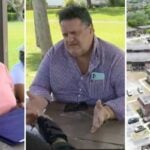Like many condo owners in Florida, residents at the Heron Condominiums in West Kendall were expecting to receive a special assessment of some kind. The mandatory 40-year recertification inspection is the result of new regulations for condominiums in the state following the deadly 2021 condo collapse in Surfside, Florida.
But when their special assessment came back for $3.48 million, the residents were aghast.
While the aging condo building was likely to need repairs of some kind, the colossal price tag has left many worried about potentially losing their homes.
"They’re not against the special assessment," said Mayra Rodriguez, a resident speaking on behalf of several homeowners in an interview with CBS News Miami. "They’re just saying, why so much?"
Don’t miss
- I’m 49 years old and have nothing saved for retirement — what should I do? Don’t panic. Here are 6 of the easiest ways you can catch up (and fast)
- Robert Kiyosaki warns of a ‘Greater Depression’ coming to the US — with millions of Americans going poor. But he says these 2 ‘easy-money’ assets will bring in ‘great wealth’. How to get in now
- Gain potential quarterly income through this $1B private real estate fund — even if you’re not a millionaire. Here’s how to get started with as little as $10
Expected costs put pressure on budgets
Those who own condos know that some of the costs and maintenance responsibilities are outside the residents’ control.
For example, this condo needs roof repairs, building repairs, waterproofing and other structural work. And, until these are completed, the buildings cannot be recertified and must bare code violation signs throughout the property. These repair costs are covered through the assessment, which is divided between the number of units a building has so that each unit covers a portion of that total bill.
In this case, the $3.48 million assessment is spread across approximately 250 units. Residents at Heron have a choice between two different payment options: a 10-year bank loan amounting to roughly $154 per unit per month or a self-funded payment of over $13,200, paid either as a lump sum or divided into four quarterly payments of roughly $3,300, starting in June.
In order for the condo board to move forward with the bank loan payment option, at least 66% of the condo owners must approve that action. With the vote yet to happen, residents are worried about being able to cover the cost on their own.
“That’s $3,300 every three months," Rodriguez explained. "Most people here just can’t afford that."
Beyond the consternation about the upcoming assessment, residents are frustrated about the lack of communication and transparency from the board. The owners at this condo complex already pay $260 per month in dues. But they aren’t clear on how those funds have been used.
"Where is all the money we’ve been paying for?" asked Jose Redondo, an owner in the complex.
Read more: Want an extra $1,300,000 when you retire? Dave Ramsey says this 7-step plan ‘works every single time’ to kill debt, get rich in America — and that ‘anyone’ can do it
Some Florida condo owners could see legislative relief
Earlier this month, Governor Ron DeSantis signed a bill aiming to bring immediate financial relief to condo owners.
The bill allows condo associations to tap into lines of credit or loans for their reserves and allows for an extra year to make repairs following a structural inspection.
While this bill may offer some financial relief for condo owners in the short term, it doesn’t entirely protect their budget or longer-term financial wellbeing. The ability to tap into loans likely means many condo owners will face an ongoing monthly payment (with interest) or higher condo dues. Similarly, not all residents have the luxury to wait for the bill to come into effect in July (Heron residents for example are expected to start paying their portions of the assessment in June).
So while Florida’s post-Surfside condo regulations were made with safety in mind, the new requirements have also meant greater financial strain for those living on a fixed income. Some residents of the Heron complex are seniors living on such an income. While their property values might be high, these lower-income residents may feel ‘house rich but cash poor.’
Depending on the situation, some residents might also not qualify for new loans to cover their assessment costs. If they wanted to leave the complex, they might struggle to find a comparable housing option in the area.
With that, many condo owners might feel compelled to sell below market value, downsize to a smaller place, relocate to a more affordable city, or switch to renting for the foreseeable future.
What to read next
- JPMorgan sees gold soaring to $6,000/ounce — use this 1 simple IRA trick to lock in those potential shiny gains (before it’s too late)
- This is how American car dealers use the ‘4-square method’ to make big profits off you — and how you can ensure you pay a fair price for all your vehicle costs
- Here are 5 ‘must have’ items that Americans (almost) always overpay for — and very quickly regret. How many are hurting you?
- How much cash do you plan to keep on hand after you retire? Here are 3 of the biggest reasons you’ll need a substantial stash of savings in retirement
Like what you read? Join 200,000+ readers and get the best of Moneywise straight to your inbox every week. Subscribe for free.
This article provides information only and should not be construed as advice. It is provided without warranty of any kind.
